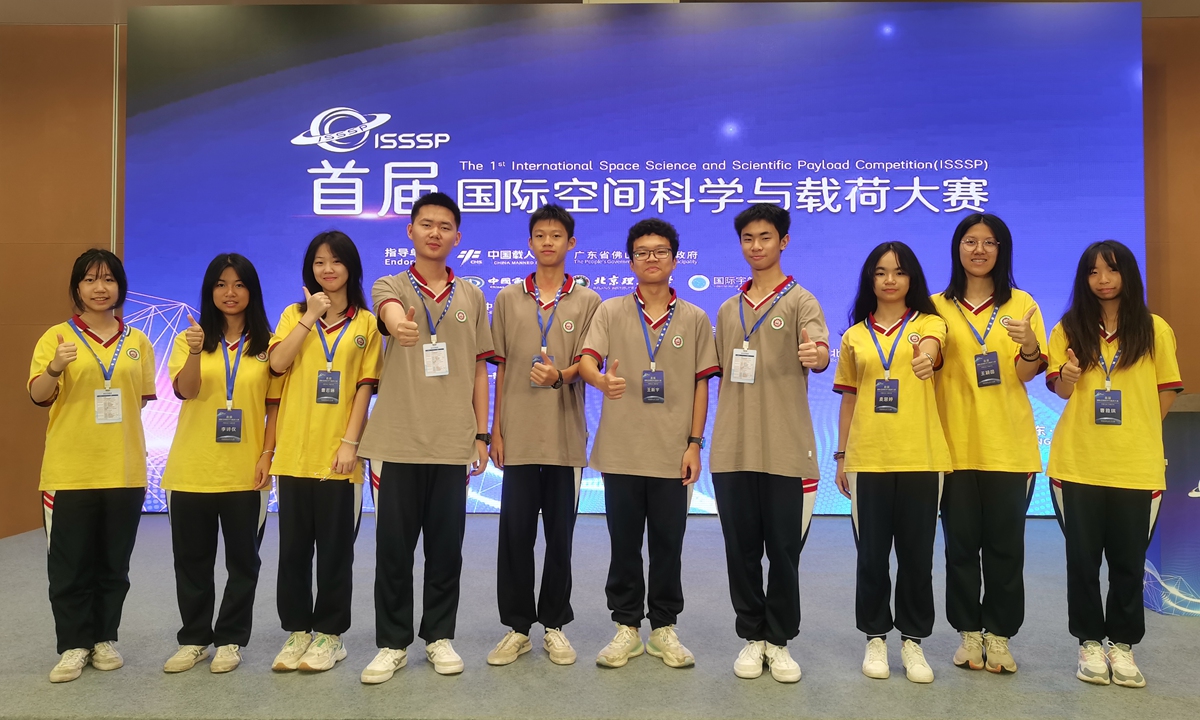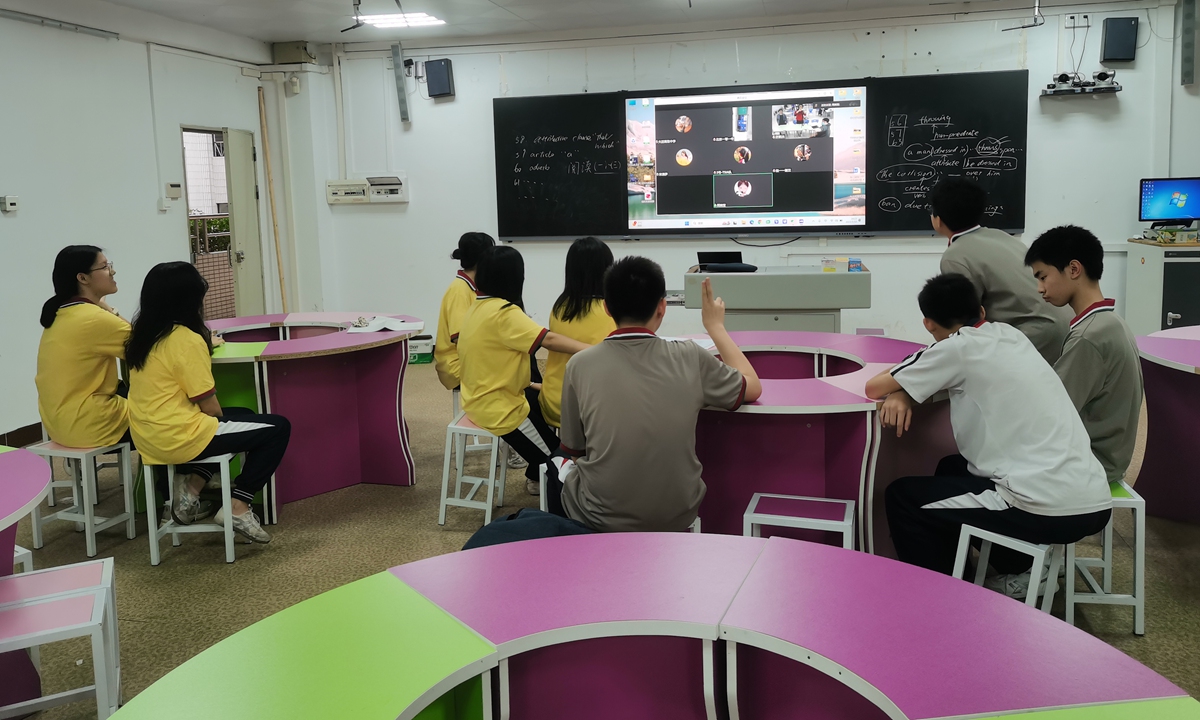IN-DEPTH / IN-DEPTH
Voice from China Z: Young innovators offer novel ideas for China Space Station, ISS
Editor's Note:
Young Chinese people in the new era are confident, aspirational, and responsible. With a global vision, they stand at the forefront of the times ready to fully commit to a more global outlook. Chinese people accept and quickly respond to the world's trending schools of thought. Some members of China's Generation Z have begun to practice the tenets of "global citizenry" and use their thought processes and actions to influence society.
The Global Times has launched a series of introductory stories to China's Gen Zers - those born after 1995 - who are interested in different global topics, such as environmental protection, equality, and employment issues, and invites them to share their stories, sentiments, and ideas on social media platforms.
In this article, two high school students share their passion for exploring the universe and a research project on the cultivation of multi-generational mudskippers in space.

With the successful docking of China's latest cargo spaceship Tianzhou-6 at the country's space station on Thursday, more and more scientific payloads will have a chance to tour around the universe as a new generation of young innovators from China and abroad continues to make remarkable strides in the field of space exploration, fueled by their unwavering passion and insatiable curiosity.
At the first International Space Science and Scientific Payload Competition, which kicked off in Foshan, South China's Guangdong Province on Thursday, Li Shiyi and Yang Ruiyang, two students from Foshan's Dali High School, brought their research projects on the cultivation of multi-generation mudskippers to the space station, coming second place at the competition.
The research uses the mudskipper which is adapted to live both on land and in water, and can take in oxygen from different environments through cutaneous respiration and their oral mucosa. It aims to study the first amphibious fish that can be raised in the space station for long periods, providing the basis for the future survival of human beings in space. What's more, the fish is a tasty and nutritious dish to enrich the astronauts' menus.
In an interview with the Global Times during the competition, they said the project was inspired by the experiments taught by Shenzhou-13 taikonaut Wang Yaping while she was in orbit at the Chinese space station.
The Tiangong classroom, a livestream from China's Tianhe space station core module some 400 kilometers above Earth, brought together millions of students across the country to observe all kinds of interesting little experiments that Wang did in the microgravity environment.
"During the Tiangong classroom, Wang talked about experiments involving fish and rice cultivation, and we extended it to the mudskipper," Li said.
"Another thing that we would like to explore is, since we noticed that the foods taikonauts eat are usually dehydrated and vacuum-sealed, they may not be very fresh. Therefore, I hope that by conducting this experiment, they might eventually be able to cook the fish after finishing the experiment and enjoy a hot bowl of fresh fish soup in space whenever they want, enriching not only taste and nutrition but also easing their cravings for the rich foods from home," the student added.
Eating a hot bowl of fish soup - this simple wish touched every judge and audience member present, as it carried the sincerest form of care and love for the taikonauts from a Z-generation from Guangdong Province, where food is seen as the best cure to relieve stress and alleviate the worries life brings.
In talking with the Global Times, Li said that she wants to become a taikonaut like Wang when she grows up. She reminisced about her childhood fascination with the universe, noting the allure of the unknown beyond our planet. The inspiring journeys of Chinese taikonauts and their stories of space exploration prompted Li's pursuit of her dream.
"Even as small and insignificant beings, humans possess the capability to unlock the mysteries of the universe," she said.

Despite challenges in controlling water and soil conditions for the mudskipper, Yang said that their determination to advance people's understanding of living organisms in space exemplified the importance of international collaboration.
When asked about the recent challenges in international collaboration in space given the tense relations between China and the US, Li said she hopes to have more exchanges with countries like the US with more advanced space technology despite differences in opinion. "By doing so, we can use our mature and advanced technology to help countries that have lagged relatively behind in space development, making the world a better place."
Their passion for space also comes from the impressive speed of China's advancement in space technology in recent years.
Envisioning the road ahead, Yang revealed his deep interest in biology and space, combined with the future establishment of the lunar research center by China and even a possible Mars landing, have fueled his aspiration to contribute to the nation's space endeavors and expand his own knowledge.
He also expressed a desire to witness humanity's expansion into new frontiers, including the possibility of space migration and settlement on other planets.
Li's own interests extend beyond space biology to encompass practical applications.
Fascinated by the China-developed Beidou Navigation System, she proposed integrating it with ground devices like electric scooter helmets. This innovation aims to address blind spots that often lead to conflicts and accidents on roads. By utilizing the Beidou Navigation System and incorporating cameras, Li envisioned a helmet that could detect and locate blind spots so as to boost road safety.
The first International Space Science and Scientific Payload Competition is the first international aerospace competition in China aimed at gathering and nurturing outstanding global talents and projects in space science and payload technology. The winning projects will be recommended as candidates for flights to the China Space Station and the ISS, the Global Times learned on Thursday.
Themed "A Shared Space for a Better Future," it has attracted student groups from more than 30 countries including Spain, Italy, Egypt, Russia, Pakistan, Argentina, and Mexico. There are 116 teams - 81 from China and 35 from abroad. Thirteen high school groups were invited to participate as well.
Young Chinese people in the new era are confident, aspirational, and responsible. With a global vision, they stand at the forefront of the times ready to fully commit to a more global outlook. Chinese people accept and quickly respond to the world's trending schools of thought. Some members of China's Generation Z have begun to practice the tenets of "global citizenry" and use their thought processes and actions to influence society.
The Global Times has launched a series of introductory stories to China's Gen Zers - those born after 1995 - who are interested in different global topics, such as environmental protection, equality, and employment issues, and invites them to share their stories, sentiments, and ideas on social media platforms.
In this article, two high school students share their passion for exploring the universe and a research project on the cultivation of multi-generational mudskippers in space.

The group of students from Foshan's Dali High School brings their research project to the first International Space Science and Scientific Payload Competition on May 11, 2023. Photo: courtesy of Dali High School
With the successful docking of China's latest cargo spaceship Tianzhou-6 at the country's space station on Thursday, more and more scientific payloads will have a chance to tour around the universe as a new generation of young innovators from China and abroad continues to make remarkable strides in the field of space exploration, fueled by their unwavering passion and insatiable curiosity.
At the first International Space Science and Scientific Payload Competition, which kicked off in Foshan, South China's Guangdong Province on Thursday, Li Shiyi and Yang Ruiyang, two students from Foshan's Dali High School, brought their research projects on the cultivation of multi-generation mudskippers to the space station, coming second place at the competition.
The research uses the mudskipper which is adapted to live both on land and in water, and can take in oxygen from different environments through cutaneous respiration and their oral mucosa. It aims to study the first amphibious fish that can be raised in the space station for long periods, providing the basis for the future survival of human beings in space. What's more, the fish is a tasty and nutritious dish to enrich the astronauts' menus.
In an interview with the Global Times during the competition, they said the project was inspired by the experiments taught by Shenzhou-13 taikonaut Wang Yaping while she was in orbit at the Chinese space station.
The Tiangong classroom, a livestream from China's Tianhe space station core module some 400 kilometers above Earth, brought together millions of students across the country to observe all kinds of interesting little experiments that Wang did in the microgravity environment.
"During the Tiangong classroom, Wang talked about experiments involving fish and rice cultivation, and we extended it to the mudskipper," Li said.
"Another thing that we would like to explore is, since we noticed that the foods taikonauts eat are usually dehydrated and vacuum-sealed, they may not be very fresh. Therefore, I hope that by conducting this experiment, they might eventually be able to cook the fish after finishing the experiment and enjoy a hot bowl of fresh fish soup in space whenever they want, enriching not only taste and nutrition but also easing their cravings for the rich foods from home," the student added.
Eating a hot bowl of fish soup - this simple wish touched every judge and audience member present, as it carried the sincerest form of care and love for the taikonauts from a Z-generation from Guangdong Province, where food is seen as the best cure to relieve stress and alleviate the worries life brings.
In talking with the Global Times, Li said that she wants to become a taikonaut like Wang when she grows up. She reminisced about her childhood fascination with the universe, noting the allure of the unknown beyond our planet. The inspiring journeys of Chinese taikonauts and their stories of space exploration prompted Li's pursuit of her dream.
"Even as small and insignificant beings, humans possess the capability to unlock the mysteries of the universe," she said.

The group of students from Foshan's Dali High School brings their research project to the first International Space Science and Scientific Payload Competition on May 11, 2023. Photo: courtesy of Dali High School
Yang recalled a memorable incident that occurred during the experiment, when the fish "turned white" due to evaporation caused by the cold weather. This finding inspired them to enhance environmental factors by observing the fish's physical conditions, to make uncontrollable factors manageable.Despite challenges in controlling water and soil conditions for the mudskipper, Yang said that their determination to advance people's understanding of living organisms in space exemplified the importance of international collaboration.
When asked about the recent challenges in international collaboration in space given the tense relations between China and the US, Li said she hopes to have more exchanges with countries like the US with more advanced space technology despite differences in opinion. "By doing so, we can use our mature and advanced technology to help countries that have lagged relatively behind in space development, making the world a better place."
Their passion for space also comes from the impressive speed of China's advancement in space technology in recent years.
Envisioning the road ahead, Yang revealed his deep interest in biology and space, combined with the future establishment of the lunar research center by China and even a possible Mars landing, have fueled his aspiration to contribute to the nation's space endeavors and expand his own knowledge.
He also expressed a desire to witness humanity's expansion into new frontiers, including the possibility of space migration and settlement on other planets.
Li's own interests extend beyond space biology to encompass practical applications.
Fascinated by the China-developed Beidou Navigation System, she proposed integrating it with ground devices like electric scooter helmets. This innovation aims to address blind spots that often lead to conflicts and accidents on roads. By utilizing the Beidou Navigation System and incorporating cameras, Li envisioned a helmet that could detect and locate blind spots so as to boost road safety.
The first International Space Science and Scientific Payload Competition is the first international aerospace competition in China aimed at gathering and nurturing outstanding global talents and projects in space science and payload technology. The winning projects will be recommended as candidates for flights to the China Space Station and the ISS, the Global Times learned on Thursday.
Themed "A Shared Space for a Better Future," it has attracted student groups from more than 30 countries including Spain, Italy, Egypt, Russia, Pakistan, Argentina, and Mexico. There are 116 teams - 81 from China and 35 from abroad. Thirteen high school groups were invited to participate as well.


